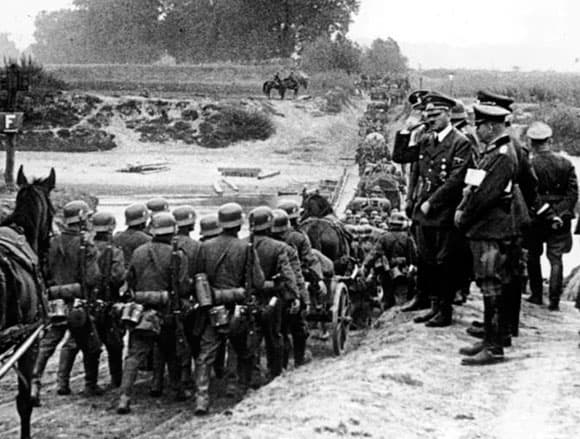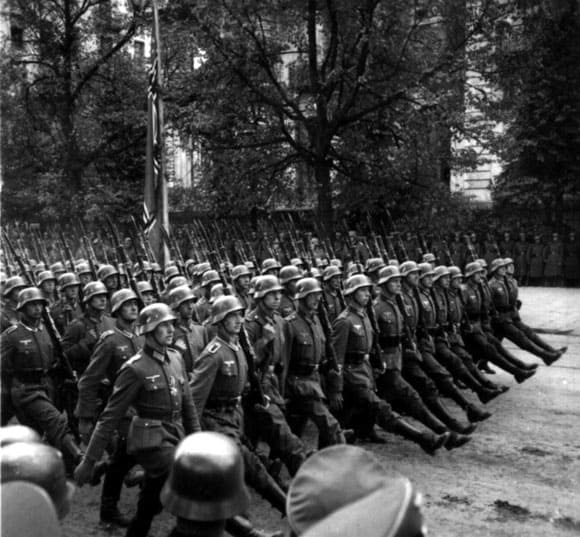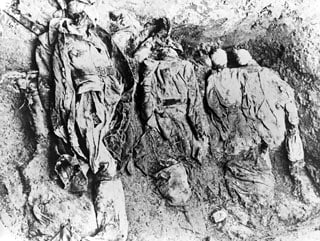
Although modifications to the American defense strategy were widely expected, the announcement was carried out in a very unfortunate manner that underscores the lack of understanding among American elites of the historical developments surrounding the outbreak of World War II, in particular the lack of knowledge about the role of the Soviet Union in destroying Poland and persecuting ethnic Poles.

The Invasion of Poland, September 1939
The complicated events leading up to the outbreak of World War II that most often are presented either from the German or the Soviet point of view are widely misinterpreted because they rarely consider the Polish point of view. However, to be accurate they must be viewed in the context of historical relations between Poland, Russia and Germany. 18th century partitions of Poland by Russia, Prussia and Austria brought about territorial expansions of autocratic empires at the expense of democratic Poland. For over a century the Polish people suffered the loss of their statehood, assault on their culture, language and national identity, as well as educational, professional and financial inequalities.
When Poland was finally reborn after WWI as a result of the relentless struggle of the Polish people, the defeated powers of Germany and Soviet Russia saw Poland as a bastard of the Versailles Treaty formed at the expense of their empires. There was no understanding or recognition of the harm done to the Polish people through violent partitions and decades of oppression but instead prevalent resentment for the lost territory.
In August of 1939 Nazi Germany and the Soviet Union were able to overcome their fundamental differences because they found one overriding, uniting common ground – the destruction of Poland. In the infamous Ribbentrop Molotov Non-Aggression Pact from August 23, 1939, Stalin and Hitler agreed to cooperate and help each other in partitioning Poland and destroying the Polish nation. Once Poland fell as a result of the coordinated Nazi-Soviet attack on September 1 and September 17, respectively, the rest of Eastern and Central European fell as well.
Expansionistic and imperialistic motives of Nazi Germany and the Soviet Union were clearly on display in the official pronouncements of both countries. Germany’s doctrine of obtaining living space in the East was publicly formulated long before the invasion of Poland. The Soviet antagonistic attitude towards Poland was demonstrated in the protocols leading up to the signing of the Ribbentrop-Molotov Pact and in subsequent pronouncements fundamentally hostile towards Poland. Yet, today there are many strong pro-German and pro-Russian voices arguing that both Germany and the Soviet Union were forced to attack Poland as a result of Poland’s foreign policy. Let us then examine those voices vis-à-vis the Polish point of view.

German troops parade through Warsaw, Poland, September 1939.
German point of view
Most pro-German historians argue that Germany was treated too harshly by the Versailles Treaty. That anger over the war losses combined with the economic depression of 1933 brought about the fascist movement that led to war. Following this logical path, some pro-German historians and influential politicians like Pat Buchanan argue that German demands towards Poland were reasonable. These demands were twofold: a) territorial demands for the return of Danzig and Corridor, and b) political demands for alliance with Germany against the Soviet Union. They point to good Polish-German relations before the war and argue that these good relations were destroyed by Poland’s rejection of Hitler’s reasonable demands. In reality they argue for more appeasement towards Hitler at Poland’s expense.
Polish response
First, German territorial demands towards Poland may sound reasonable only to those who do not understand Polish-German relations over the centuries. From the time Poland was baptized in 966, her western neighbors attempted to block Poland’s access to the Baltic Sea in order to control the agricultural trade via Vistula River from Krakow and Warsaw. Throughout history, any time Poland would lose access to the sea, it would subsequently lose its economic strength, leading to the loss of independence. For Poland to give up the rights to Danzig was an equivalent to the loss of her independence.
Hitler not only was aware of it but he openly demanded Poland’s subordination. In demanding Danzig, he was very clear that he wanted to subordinate Poland like he did his other neighbors. From October 1939 to January 1939 German demands on Poland to settle the question of the “corridor” and Danzig began to take a more stringent form. Accompanied by renewed proposals that Warsaw join the Third Reich against the Soviet Union they aimed at subordination of Poland to Germany. So, for Poland to accept Hitler’s ultimatum meant to give up willingly just recently regained independence.
We shall keep in mind that already before the war the Nazis proclaimed themselves as the master race and declared Polish people as sub-humans. Hans Frank on the occasion of his appointment as Governor of the conquered Polish lands declared that “the Poles shall become the slaves of the German Reich.” Soon thereafter Himmler proclaimed that “all Poles will disappear from this earth. It is imperative that the great German nation considers the elimination of all Polish people as its chief task.” So anybody who argues that Poland should have surrendered without a fight has no understanding of the political climate at that time.
Also, it is dishonest to argue today that Hitler merely wanted Danzig and the Corridor, and therefore his demands were reasonable. There are official German documents from that era that clearly spell out the policy of world domination through territorial expansion. Also, lyrics of a popular German song from that time reflect the mood of the masses: “Today Germany belongs to us; tomorrow the world.” The subsequent events clearly prove these intentions. And yet, there are many who argue that Poland should have appeased Hitler. Leading among them is an influential pro-German American politician Patrick Buchanan.
Russian point of view
Russia was forced into signing the Ribbentrop-Molotov Pact as a result of a lack of cooperation from Great Britain, France and Poland. Recently the Russian Federation advanced this argument further accusing Poland of conducing secret talks with Hitler against the Soviet Union. Russia also argues that a decision to join Hitler in partitioning Poland and Eastern Europe was vital to the security of the Soviet Union since it limited a growing German threat and built a buffer zone against Germany. An official argument for the invasion of Poland that was given to the Russian people and to the international community at the time of invasion stated that in view of the collapse of the Polish State, the Soviet Union had to intervene in order to protect Ukrainian and Belorussian minorities in Poland.
Polish response
Contrary to Russian assertions that Poland conducted secret talks with Hitler it was the Soviet Union that conducted secrets talks with Germans thorough their charge d’affair in Berlin Georgii Astahkov since 1934. The replacement of Foreign Affairs Minister Maxim Litvinov with Vyacheslav Molotov in May of 1939 indicated a final shift in the Soviet policy towards Germany. By the time the Franco-British delegation arrived in Moscow on August 12, 1939, Stalin already knew that Hitler was willing to give him everything he wanted. At that moment Hitler offered to conclude an agreement with Moscow which recognized Soviet sphere of influence in East and Central Europe, and in Poland in particular. So, the Soviet Russia simply chose a better deal that offered her significant territorial gains at the expense of Poland and other Eastern European countries.
Pro Soviet historians often argue that Poland’s refusal to allow the Soviet military forces enter Poland in the event of a conflict was the reason why the Soviets turned to Germany. But the careful study of the timeline shows that Stalin decided to go with Hitler even before this issue was even raised by the Soviet negotiators with the Franco-British delegation.
Often cited buffer zone theory has been discredited by the reality since the annexation of half of Poland did not spare the Soviet Union from the German attack.
The collapse of the Polish State did not occurred as a result of the German aggression. The Polish government decided to evacuate to France and later to Great Britain as a direct result of the Soviet aggression when it became absolutely clear that Poland would not withstand two aggressors at the same time.
The most popular argument to protect Belorussian and Ukrainian minorities in Poland has a fascinating background. When Germany attacked Poland, Hitler urged Stalin to attack Poland as soon as possible from the other side. Stalin replied that he must first justify his intervention to the masses. Germany then suggested that Stalin should tell his people that the Soviet Union must invade Poland in order to protect Russian-speaking minorities there. In response Molotov stated that ‘the Soviet Union had thus far not concerned itself about the plight of minorities in Poland and had to justify abroad in some way or the other its present intervention.’ Therefore, he stated, the Soviet Government needed more time. After further pressure from Berlin, Stalin finally accepted the recommended argument. A German ambassador in Moscow reported that the Soviet Government had intended to take the occasion of the further advance of German troops to declare that Poland was falling apart and that it was necessary for the Soviet Union to come to the aid of the Ukrainians and the White Russians ‘threatened by Germany.’ This explanation was not acceptable to the Germans however because it portrayed them as the enemies. Molotov conceded that ‘the projected argument contained a note that was jarring to German sensibilities.’ So, the argument was further modified is such a way that would call for the protection not against the invading German army but rather against oppressive Polish landowners and government officials. Accordingly, this fine-tuning of the propaganda argument made Poland instead of Germany the public enemy number one, and effectively turned the Soviet public opinion against oppressive Polish landowners and government officials.
Polish Point of View
Polish foreign policy in the 1930-ties that was based on four principles formulated by Marshal Józef Pilsudski and carried out by Minister of Foreign Affairs, Joseph Beck consisted of the following four principles:
1) the policy of balance between Germany and the Soviet Union but no alliance with either of them since in either case Poland was bound to lose its independence.
2) For the same reason, the Poles could not accept any German or Soviet guarantees of security or help in case of war.
3) Poland had to protect its right in the Free City of Danzig and inviolability of the Polish- German frontier.
4) The alliance with France must be maintained and Poland could not be on Germany’s side in case of a European war.
The history proved that the above principles of the Polish foreign policy were correct at the time. The Nazi- Soviet Pact to kill Poland had nothing to do with German grievances over Danzig or with Russian concerns over its minorities. Instead it was driven by vengeance over lost territories in WWI. It was a classic race for world domination and territorial expansion at the expense of the smaller nations.
On September 17, 1939, the Red Army attacked Poland and easily annexed 51% of Polish territory with 11 million Polish citizen. The Soviets permanently annexed to the Soviet Union the Polish lands that Russia grabbed during the XVIII partitions of Poland. They also annexed the southeast region of Poland with the city of Lwów, the third most important cultural center of Poland. This area was never before under the Russian control or domination.
In the secret protocol to the German-Russian Boundary and Friendship Treaty signed on September 28, 1939, when Warsaw finally surrendered at the urging of Great Britain, Hitler and Stalin committed themselves to cooperate closely in combating Polish resistance. Yet another Secret Protocol provided that:
“both parties will tolerate in their territories no Polish agitation which affects the territory of the other party. They will suppress in their territories all beginnings of such agitation and inform each other concerning suitable measures for this purpose.”
This declaration laid the foundation for close Nazi-Soviet cooperation in combating any signs of Polish resistance. In the winter of 1939-1940 senior secret police officers of both invaders held regular meetings in such Polish bastions as Kraków and Zakopane, exchanging top secret information about combating the Polish resistance and developing the best methods to infiltrate the Polish underground and destroy any signs of the Polish identity.

Remains of victims from the Katyn Massacre
Security forces of both Nazi Gestapo and Soviet NKVD joint forces to exterminate Polish intelligencia, clergy, gentry, and all those who were considered carrier of Polish identity. On both sides of the partition line, the Poles were targeted for total and permanent extermination. While the German atrocities committed on the Polish people are better known, the Soviet extermination policies towards ethnic Poles are rarely discussed or even mentioned. For half a century this subject, of which the Katyń crime became the symbol, was on the censorship list all over the world. Today there is a growing realization that the Polish loses on the Soviet side were at least equal to if not greater than those on the German side of the partition line. The extent of the genocide committed on the Polish population on the Soviet side of the partition line is well illustrated on a website the Kresy–Siberia Virtual Museum, http://www.kresy-siberia.org/ReceptionDesks/Default.aspx launched by children of Polish deportee from Eastern Poland under the leadership of Stefan Wiśniowski who found his new home in Australia.
As a result of the failure of the international community to assure Poland’s security, the Polish people were subjected to inconceivable suffering with grave implications for many generations to come, the entire world was plunged into the greatest catastrophe ever, and the entire region of Eastern and Central Europe was enslaved for half a century. This tragic history teaches that the voice of Poland must be carefully taken into account while debating any international security arrangements.
Maria Szonert, Esq.
